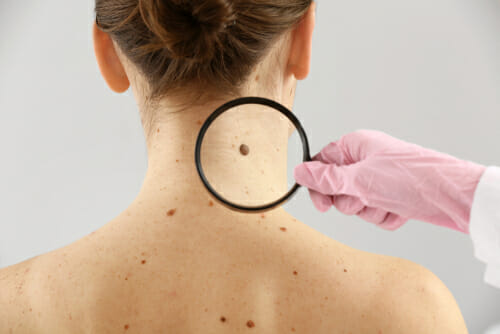Skin cancer is among the top 15 cancer conditions certified by the WTC Health Program in 9/11 responders and survivors. Many who spent time at Ground Zero or in the NYC Exposure Zone continue to develop melanoma and non-melanoma skin cancer two decades later, due to long latency periods.
A diagnosis of skin cancer can be life-changing. In some cases, the cancer can also spread to other parts of the body. If you’re an eligible responder or survivor who has developed 9/11-related skin cancer, you may be able to receive medical treatment from the WTC Health Program — and be entitled to monetary compensation from the September 11th Victim Compensation Fund.
9/11-Related Non-Melanoma Skin Cancer
Non-melanoma skin cancer is the most common certified 9/11-related health condition in responders by the World Trade Center Health Program — and the third most frequently diagnosed cancer in survivors. Non-melanoma cancers can include basal cell carcinoma and squamous cell carcinoma.
Basal cell carcinoma may look like a transparent bump or a lesion with dark spots. It can also appear as a scaly, reddish patch or a lesion that doesn’t have a defined border. Although it is most often found on the head and neck, it can also develop on other body parts. While UV-radiation from the sun can be a common cause of basal cell carcinoma, exposure to arsenic — a toxin found in the 9/11 dust cloud — is also linked to the condition.
Similarly, squamous cell carcinoma can not only develop due to sun exposure, but it can also be caused by chemical agents such as those that filled the air for months in the NYC Exposure Zone. Although this type of cancer can vary from person to person, it usually appears on various parts of the body as a scaly patch, a bleeding open sore, or an elevated growth.
Many 9/11-related cancers may be effectively treated if caught early. However, if it goes undetected, the cancer can spread and the prognosis can worsen. This is why it is crucial for 9/11 responders and survivors to ensure that they screen regularly for cancer — the WTC Health Program provides screening and treatment for 9/11-related cancers, including all forms of skin cancer.
9/11-Related Melanoma Skin Cancer
As a result of inhaling the carcinogens in the 9/11 dust cloud, and absorbing them through the skin, countless responders and survivors have also developed melanoma. In fact, melanoma is the third most common type of cancer found in 9/11 responders who worked on the rescue and recovery operations at Ground Zero and in the surrounding area. In addition, hundreds of survivors who lived, worked, or went to school in the NYC Exposure Zone have been diagnosed with the condition.
According to The Skin Cancer Foundation, melanoma can be recognized by keeping “ABCDE” in mind:
- A for asymmetrical shape
- B for uneven borders
- C for multiple colors
- D for diameter or dark color
- E for evolving shape, size, or color
Melanoma is much more likely to spread than non-melanoma if it isn’t timely diagnosed. Treatment can range from surgery — if it’s caught in the early stages — to radiation therapy, immunotherapy, and the use of targeted drugs. If other treatment options don’t work, a doctor may recommend chemotherapy.
VCF Compensation for 9/11 Skin Cancer Conditions
The VCF awards compensation to eligible responders and survivors for the economic and non-economic losses they have suffered in connection with their WTC Health Program certified 9/11-related skin cancer conditions. An award for economic loss is meant to cover pecuniary losses such as loss of earnings and benefits, and unreimbursed medical expenses. Additionally, the VCF may also issue monetary compensation for the pain and suffering, loss of enjoyment of life, and mental anguish you have experienced due to your 9/11-related cancer condition.
Generally, the maximum amount of non-economic loss that the VCF will award for a cancer condition is $250,000. The VCF will consider a number of factors to determine the appropriate award — including whether the cancer has spread, will recur, or cause permanent complications.
The amount usually awarded by the VCF for non-melanoma skin cancer at multiple sites is within the range of $90,000. However, in some cases, the Special Master may consider multiple conditions to determine whether you should be entitled to an award that exceeds the cap. For instance, if you have been diagnosed with several types of cancer, your non-economic loss award may be greater than $250,000.
Importantly, the VCF will not review a claim or award compensation unless you have first had your 9/11-related skin cancer certified by the WTC Health Program.
Contact a New York City 9/11 Victim Compensation Fund Attorney
If you’re a 9/11 responder or survivor who has been diagnosed with 9/11-related skin cancer, you may be entitled to receive compensation from the VCF. Since the process of submitting a claim to the VCF can involve many complex regulations and confusing deadlines, it’s best to have the guidance of an experienced 9/11 Victim Compensation Fund attorney who can help ensure you receive the full amount of compensation you deserve.
The 9/11 Victim Compensation Fund attorneys at The Dearie Law Firm, P.C. have represented claimants and their families in 9/11 VCF claims for over a decade. For a free consultation, contact us today.

